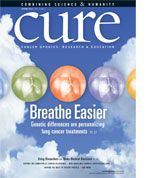Alzheimer's Disease and Cancer
Researchers study an unlikely connection between two diseases, cancer and Alzheimer's disease.
A new study shows that people who have or ever will have cancer are less likely than the general population to develop Alzheimer’s disease, and people who develop Alzheimer’s disease have a reduced risk for cancer.
Researchers are exploring what might cause this connection and how it could open doors to new treatments for both diseases.
The study, published in the journal Neurology, included more than 200,000 people in Italy ages 60 and older. Those who received a cancer diagnosis during the five-year study were 35 percent less likely to receive an Alzheimer’s diagnosis than the general population. Participants who received an Alzheimer’s diagnosis were 50 percent less likely than others to receive a cancer diagnosis. The inverse relationship, strongest in people over age 70, applied in varying degrees to most cancer types, but not to prostate cancer.
Skeptics have previously attributed this phenomenon to the underdiagnosis of one condition in people who already have the other. “If you have cancer or Alzheimer’s disease, all the symptoms that follow the diagnosis tend to be attributed to that diagnosis,” says Massimo Musicco, of the National Research Council of Italy in Milan and the study’s lead author.
However, Musicco’s group found that people with one of these diseases had lower rates of the other disease, compared with the population at large, both before and after their diagnosis.
“To me that’s an ironclad argument,” says Catherine Roe, a research assistant professor of neurology at the Knight Alzheimer’s Disease Research Center at Washington University in St. Louis. “If physicians have no idea that the person has one disease, how could they under-diagnose for the other disease?” Roe has authored previous studies on the inverse link between cancer and Alzheimer’s.
A forthcoming study suggests that treatment with chemotherapy might further reduce the risk of Alzheimer’s in people who survive cancer.
The new study, however, might have overlooked mild cases of Alzheimer’s. The researchers identified people with the disease through records of prescriptions, hospital admissions or payment exemptions for the condition. People with Alzheimer’s who did not take prescriptions or who had not been hospitalized for it would not have been counted, which might have artificially lowered the number of Alzheimer’s cases in the study. Despite these limitations, researchers want to better understand the link that many studies have now shown and how it might inform treatment and prevention.
Lifestyle factors could explain the relationship between Alzheimer’s and some cancers. For example, perhaps smoking lowers risk for Alzheimer’s while raising the risk of smoking-related cancers, Roe says. This is a possibility because smoking tobacco has been associated with a lower risk for Parkinson’s disease—another neurodegenerative disease that also has an inverse correlation with cancer. Genetics could also play a role. Alzheimer’s is a disease of cell death, while cancer is one of uncontrolled cell growth. A genetic predisposition to one could offer protection against the other.
A gene called p53, a tumor suppressor that mediates many cellular functions, could also play a role, says Jane Driver, a researcher at the Boston VA Medical Center and an assistant professor of medicine at Harvard Medical School.
The p53 gene “keeps a potential cancer cell from dividing and sometimes makes it destroy itself, so it’s going to suppress cancer,” she says. But, Driver adds, this tendency to trigger cell death can also lead to the early demise of neurons. Some people have mutations in this gene that can make it less active and lead to both an increased risk for cancer and a decreased risk for Alzheimer’s.
The enzyme PIN1 also might play contradictory roles in cancer and Alzheimer’s, she says. Overactive PIN1 is a risk factor for cancer because it can cause increased cell proliferation. But too little PIN1 can be a precursor to Alzheimer’s. Current research into new cancer therapies looks at inhibiting PIN1. And some Alzheimer’s drug research is studying ways of preserving PIN1 function in neurons and blocking the negative effects of its dysfunction.
Finally, drugs used to treat cancer might help prevent or treat Alzheimer’s, Driver says. A forthcoming study, which includes data on 3.5 million veterans, suggests that treatment with chemotherapy might further reduce the risk of Alzheimer’s in people who survive cancer.
Although more work needs to be done to understand these findings, researchers hope that better understanding of the link between these two diseases will yield new therapies for both.
